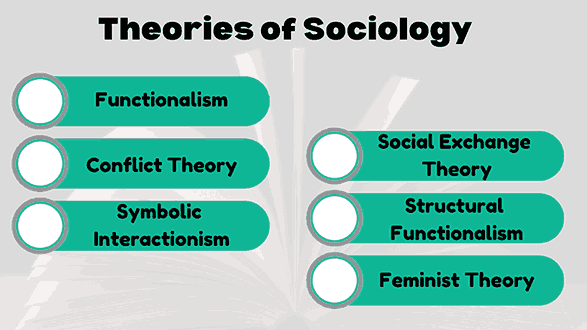
Theories in Sociology
Introduction
Sociology is the study of society and human behavior. It helps us understand how people interact, how societies function, and the various forces that shape our lives. In this article, we'll explore some fundamental theories in sociology, which are liols that sociologists use to make sense of the social world.

1: Functionalism
Functionalism is like looking at society as a machine. Just as different parts of a machine work together to make it function, functionalism suggests that different parts of society work together to maintain social stability. It's all about understanding how different institutions (like family, education, and government) serve specific functions in keeping society running smoothly.
2: Conflict Theory
Imagine society as a battlefield where different groups are competing for resources and power. That's what conflict theory is about. It highlights the inequalities and conflicts that exist in society, particularly related to class, race, and gender. It helps us understand how power imbalances can lead to social change.
3: Symbolic Interactionism
Symbolic interactionism is like studying the small building blocks of society. It focuses on how people interact with each other and how they create meaning through symbols and communication. This theory helps us see how everyday interactions shape our understanding of the world.
4: Social Exchange Theory
Think of social exchange theory as a kind of social 'give and take.' It's all about people weighing the benefits and costs of their actions in social relationships. By doing this, we can better understand why people make certain decisions and how relationships are formed and maintained.
5: Structural Functionalism
Structural functionalism is similar to functionalism but delves deeper into the interconnectedness of different parts of society. It examines how social structures (like institutions) contribute to society's overall stability and function.
6: Feminist Theory
Feminist theory focuses on the roles and experiences of women in society. It sheds light on gender inequalities and strives to create a more equitable and just social order. This theory has been crucial in addressing issues of gender discrimination and promoting gender equality.
Sociology provides us with a toolbox of theories that help us make sense of the complex web of human interactions and societal structures.
These theories offer various lenses through which we can analyze and understand the dynamics of society.
Whether you're interested in the functioning of social institutions or the dynamics of inequality, these theories provide valuable insights into the world around us. They help us ask important questions and work towards a better, more inclusive society.